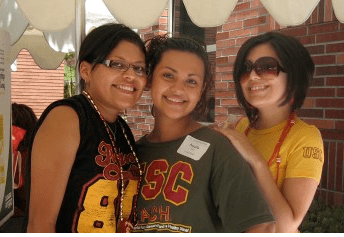By Maya Meinert
An anonymous donor has pledged $1 million to the USC Suzanne Dworak-Peck School of Social Work to establish the Cleofas and Victor Ramirez Professor of Practice, Policy, Research and Advocacy for the Latino Population.
The endowment was made in honor of the donor’s parents, a homemaker and field worker who didn’t have formal educations but strongly believed in the value of education and served as the driving force behind the donor’s success in receiving a Master of Social Work at USC.
The Mexican-American donor wanted to support social work in all its forms in the Latino community believing this population has powerful leadership potential.
“Education gifts like this provide Latinos with a way to find the voice to be heard,” the donor said. “If we can make a difference in the lives of individual Latinos, then collectively the total community benefits.”
The gift bolsters the school’s commitment to advancing scholarship that supports the well-being of Latinos and promotes informed policymaking. Additionally, it helps to attract and retain pre-eminent faculty, which in turn draws the best students.
Marilyn L. Flynn, dean of the School of Social Work, said the investment only strengthened the school’s already strong research profile supported by some of the nation’s most outstanding Latino and Mexican scholars, which number more than many other schools of social work. She also said she was exceptionally proud of the school’s Latino social work students, who comprise more than a third of its enrollment.
“We have been working for several years to endow a professorship that would symbolize that power of our scholarly and professional interests in the Latino community — and now we have it,” Flynn said. “We could not have asked for a more eagerly anticipated or deeply welcomed gift.”
Among the school’s current Latino research interests is the National Institute on Drug Abuse-sponsored Interdisciplinary Research Training Institute on Hispanic Drug Abuse, a 10-day program designed to support and advance the careers of graduate students and new investigators interested in pursuing drug abuse research, particularly for the Latino community, led by Avelardo Valdez, Charles Kaplan and Alice Cepeda.
The school also houses the USC Edward R. Roybal Institute on Aging, which advances research that enhances optimal aging of people in low-income communities. Its executive director, William Vega, is an elected member of the Institute of Medicine who has conducted community and clinical research projects on health, mental health and substance abuse throughout the United States and Latin America.
Some of the school’s other faculty have been working on significant research in the Latino community as well, including Associate Professor Maria Aranda, who recently received the California Elder Mental Health and Aging Coalition’s Older Adult Leadership and Advocacy Award at the California Association of Area Agencies on Aging Annual Meeting and Allied Conference for her efforts to improve the mental health and well-being of aging Latinos in the state. Aranda is perhaps best known for her work on problem-solving therapy as a treatment for depression with older and middle-aged Latinos.
Associate Professor Concepcion Barrio is working on a $1.4 million project to study why Latinos are often underrepresented in federally funded research and clinical trials. Barrio believes language and cultural issues may be partly to blame, particularly when researchers attempt to obtain consent from potential participants. She is partnering with colleagues at the University of California, San Diego, to study the issue and develop an educational tool to improve overall research literacy among Latinos with schizophrenia.
In another effort to boost outcomes for ethnic minorities, Assistant Professor Erick Guerrero was recently awarded a grant from the National Institute on Drug Abuse to study how the Affordable Care Act will impact substance abuse treatment programs serving Latino and African-American clients.
